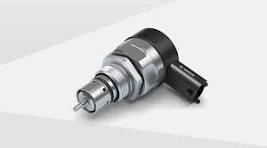Functions of a Rail Pressure Sensor in Modern Engines

The rail pressure sensor is a crucial component in modern fuel injection systems, particularly in vehicles equipped with common rail diesel engines or direct fuel injection systems in gasoline engines. This sensor plays a vital role in ensuring the efficient and precise delivery of fuel to the engine, ultimately improving performance, fuel economy, and emissions.
What is a Rail Pressure Sensor?
A rail pressure sensor is a device located on the fuel rail of an engine. The fuel rail is a high-pressure tube that delivers fuel to the injectors. The rail pressure sensor monitors the pressure of the fuel inside the rail and sends real-time data to the vehicle’s Engine Control Unit (ECU). The ECU uses this data to adjust fuel delivery to match the engine's requirements.
Primary Functions of a Rail Pressure Sensor
-
Monitoring Fuel Pressure
- The rail pressure sensor constantly measures the pressure of the fuel inside the fuel rail.
- It ensures the fuel pressure remains within the optimal range for efficient combustion.
-
Providing Feedback to the ECU
- The sensor transmits real-time pressure data to the ECU.
- This information helps the ECU regulate the fuel pump and injectors to deliver the correct amount of fuel.
-
Maintaining Engine Performance
- By ensuring the right fuel pressure, the sensor helps maintain engine power, acceleration, and responsiveness.
- It prevents under-fueling or over-fueling, both of which can negatively affect performance.
-
Improving Fuel Efficiency
- Accurate fuel pressure management optimizes combustion, leading to better fuel efficiency.
- This is particularly important in modern engines designed to minimize fuel consumption.
-
Reducing Emissions
- Precise fuel pressure regulation reduces incomplete combustion, lowering harmful emissions.
- This helps vehicles comply with stringent environmental regulations.
-
Protecting Engine Components
- Proper fuel pressure prevents strain on injectors, fuel pumps, and other related components, extending their lifespan.
- It ensures smooth engine operation and prevents potential damage caused by improper fuel delivery.
-
Diagnosing Fuel System Issues
- The rail pressure sensor aids in diagnosing issues within the fuel system.
- If the sensor detects abnormal pressure levels, it can trigger a warning light or error code, prompting the driver to seek maintenance.
How It Works
-
Pressure Detection:
- The sensor uses a piezoelectric or strain gauge element to measure pressure.
- Variations in pressure cause changes in the electrical resistance or voltage output of the sensor.
-
Data Transmission:
- The sensor converts the pressure readings into an electrical signal.
- This signal is sent to the ECU for processing.
-
ECU Adjustment:
- The ECU analyzes the pressure data and adjusts the operation of the fuel pump and injectors to maintain the desired pressure level.
Symptoms of a Faulty Rail Pressure Sensor
A malfunctioning rail pressure sensor can lead to various engine issues, including:
- Difficulty Starting the Engine: Insufficient fuel pressure can cause starting problems.
- Poor Engine Performance: Loss of power, rough idling, or stalling may occur.
- Increased Fuel Consumption: Inaccurate pressure readings can result in over-fueling.
- Check Engine Light: The ECU may detect irregularities and illuminate the warning light.
- Smoke from the Exhaust: Excessive or insufficient fuel delivery can lead to visible smoke.
Maintenance and Replacement
To ensure the rail pressure sensor functions correctly:
- Regular Inspection: Include the sensor in routine maintenance checks to identify wear or damage.
- Clean Fuel System: Use high-quality fuel and clean injectors to prevent contamination.
- Timely Replacement: Replace the sensor if it shows signs of failure or if diagnostic tests indicate a fault.
Conclusion
The rail pressure sensor is integral to the efficient operation of modern engines. By monitoring and regulating fuel pressure, it ensures optimal performance, fuel economy, and reduced emissions. Maintaining the health of this sensor is crucial for the overall reliability and longevity of your vehicle. If you suspect issues with your fuel system, consulting a qualified mechanic can help prevent further complications and costly repairs.

 Loading..
Loading..